| | | OFFLINE | | Post: 26.840
Post: 9.325 | Registrato il: 28/08/2005
Registrato il: 20/01/2009 | Administratore | Utente Master | |
|

 Thursday, June 20, 2013, Eleventh Week in Ordinary Time
Thursday, June 20, 2013, Eleventh Week in Ordinary Time
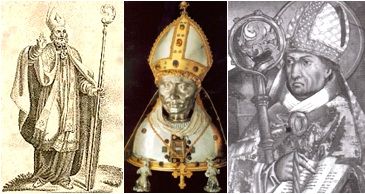 ST. ADALBERT von MAGDEBURG (d 961)
ST. ADALBERT von MAGDEBURG (d 961)
Benedictine monk, Missionary, Bishop, 'Apostle of the Slavs'
A German monk of the Benedictine Monastery of St. Maximin in Tréves, he was
consecrated a bishop and sent to Russia in 961. Princess Olga of that land
had asked Emperor Otto I the Great to provide her with a missionary. The son
of Princess Olga took her crown from her soon after Adalbert arrived in Russia,
and his mission companions were slain. He barely escaped with his own life
and made his way to Mainz, where he spent four years. He was then named
abbot of Weissenburg in Alsace and bishop of Magdeburg in Saxony. This was
a diocese created to provide missionary programs for the Slavs. There, Adalbert
was made metropolitan of the Slavs and established the dioceses of Naumberg,
Neissen, Merseberg, Brandenburg, Havelberg, and Posen. He also received
two papal legates to assist him in his vast labor. One of his pupils was
the future St. Adalbert of Prague whose fame would outdo his mentor's.
Readings for today's Mass: www.usccb.org/bible/readings/062012.cfm
AT THE VATICAN TODAY
Pope Francis met with
- Participants in the 38th annual conference of the UN's Rome-based Food and Agricultural Organization (FAO). Address in Spanish.
The official English text may be found here:
http://attualita.vatican.va/sala-stampa/bollettino/2013/06/20/news/31228.html#TESTO%20IN%20LINGUA%20INGLESE
- Participants in the annual assembly of the Riunione delle Opere nell''Aiuto alle Chiese Orientali, popularly known as ROACO,
which, under the Congregation for Oriental Churches, coordinates assistance to Catholic churches of the Eastern Rite. Address
in Italian.
Vatican Radio's English translation may be found here:
http://en.radiovaticana.va/news/2013/06/20/pope_to_middle_eastern_christians:_never_lose_hope/en1-703269
 One year ago...
One year ago...
Continuing his reflections on prayer in the Letters of St. Paul, Benedict XVI focused at the General Audience on the apostle's great hymn of praise to God that opens his Letter to the Ephesians, saying our prayer should not be limited to seeking God's help but also to thanking and praising him. After the catechesis, the Pope issued a special appeal expressing his continuing concern and prayers over the increasing frequency and intensity of anti-Christian atacks in Nigeria, where in the preceding weekend, at least 21 Christians were killed in terrorist attacks on churches. After the audience, held at Aula Paolo VI, he met with Prime Minister Valdis Dombrovskis of the Republic of Latvia.
GENERAL AUDIENCE
June 20, 2012
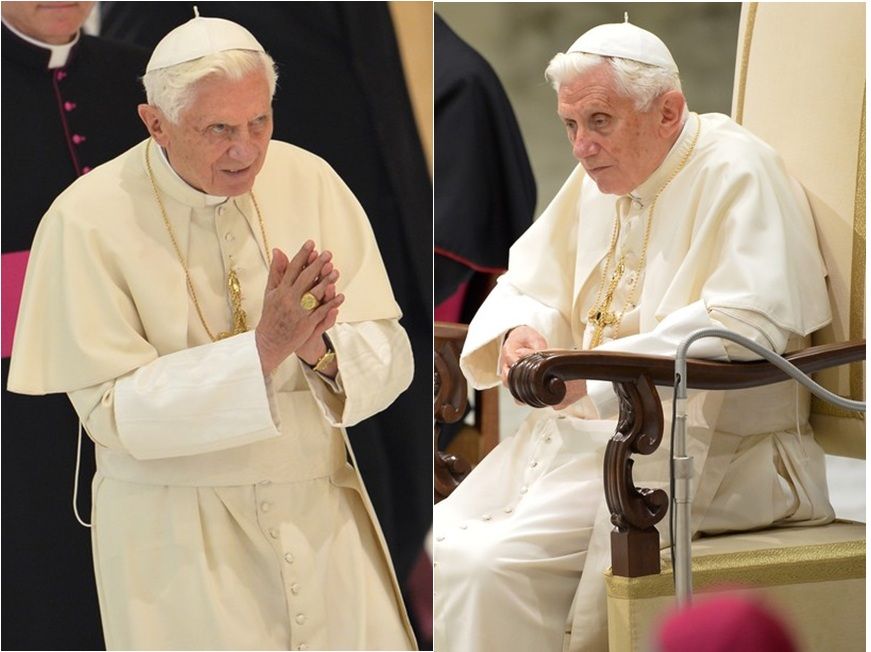
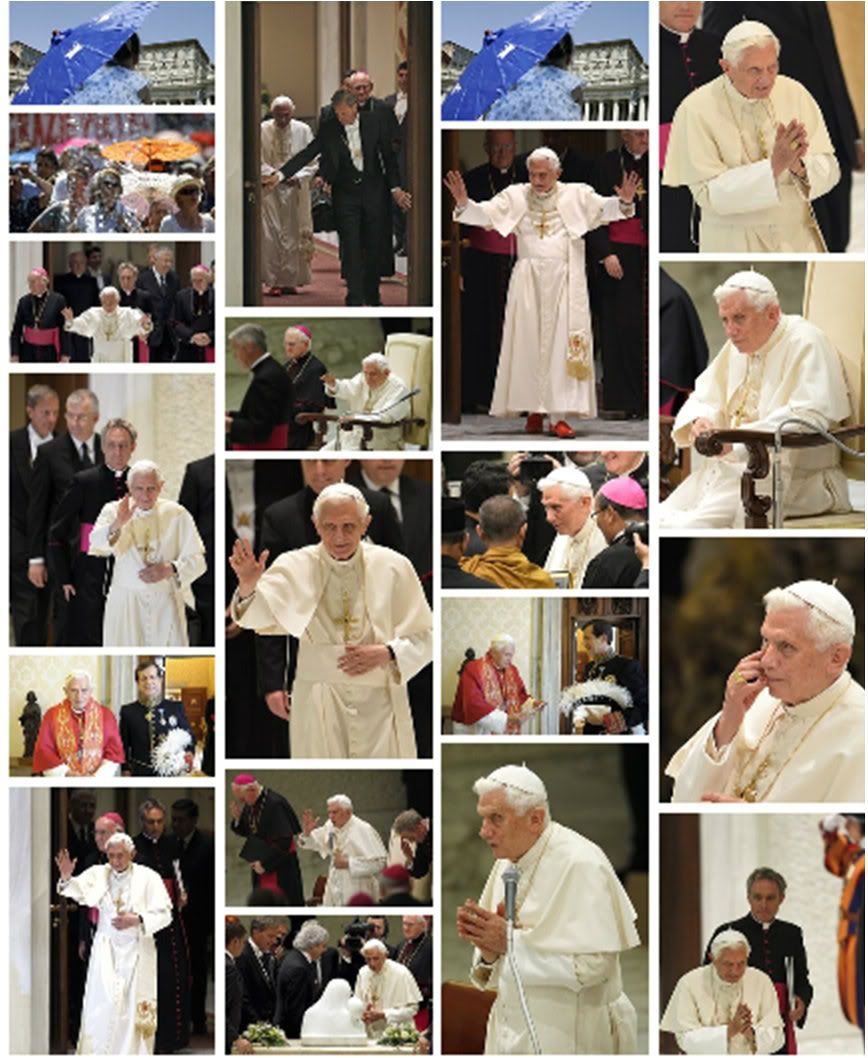
Here is a translation of the full catechesis:
Our prayer is very often a request for help in our need. It is normal for man, because we need help, we need others, we need God. And so it is normal for us to ask God for something, to seek his help; and we must keep in mind that the prayer the Lord taught us, the 'Our Father', is a prayer of request. With this prayer, the Lord teaches us the priorities when we pray, he cleanses and purifies our desires and thus cleanses and purifies our heart.
Therefore, if it is normal that we would request something when we pray, it must not be exclusively so. We also have reasons to give thanks, and if we are a bit more attentive, we can see that we receive so many good things from God. And he is so good with us that it is proper and necessary to give thanks.
Our prayer should also be one of praise: If our heart is open, we shall see, despite all our problems, the beauty of his creation, the goodness that he shows us in Creation.
Therefore, we should not just ask when we pray. We must also praise and thank God - only in that way is our prayer complete.
In his letters, St. Paul does not just speak of prayer. He reports prayers of request, certainly, but also prayers of praise and benediction for what God has wrought and continues to realize in the history of mankind.
Today, I wish to dwell on the first chapter of his Letter to the Ephesians which begins, in fact, with a prayer which is a hymn of benediction, an expression of thanksgiving, of joy. St. Paul blesses God, Father of our Lord Jesus Christ, because in him, "he has made known to us the mystery of his will" (Eph 1,9).
Truly, there is reason to to be thankful that God lets us know what has been hidden: his will about us, for us - 'the mystery of his will'. «Mysterion», «Mistero»: a term that recurs often in Sacred Scripture and liturgy. I won't get into its philology now, but in common language, it means something we cannot know, a reality that we cannot grasp with our own intelligence.
The hymn that opens the Letter to the Ephesians leads us by the hand towards the more profound significance of this term and of the reality that it indicates to us.
For believers, 'mystery' is not so much the unknown, but rather the merciful will of God, his plan of love which was fully revealed in Jesus Christ and offers us the possibility "to comprehend with all the holy ones what is the breadth and length and height and depth, and to know the love of Christ that surpasses knowledge" (Eph 3,18-19).
The 'unknown mystery' of God is revealed, and it is that God loves us and has loved us from the start, from eternity.
Let us therefore linger a bit on this solemn and profound prayer. "Blessed be the God and Father of our Lord Jesus Christ..." (Eph 1,3). St. Paul uses the verb euloghein, which generally translates the Hebrew word barak: it means to praise, to glorify, to thank God the Father as the spring of everything good in salvation, "He who has blessed us in Christ with every spiritual blessing in the heavens".
The Apostle gives thanks and praise, but also reflects the reasons that urge man to give such praise, this thanksgiving, presenting the fundamental elements of the divine plan and its stages.
First of all, we must bless God the Father because, St. Paul writes, "he chose us in him, before the foundation of the world, to be holy and without blemish before him in love" (v 4).
That which makes us holy and immaculate is love. God has called us to existence, to holiness. This choice preceded even the creation of the world. We have always been in his plan, his thought. With the prophet Jeremiah, we too can say that before he formed us in the womb of our mother, he already knew us (cfr Jer 1,6); and knowing us, he loved us.
The call to holiness, namely, communion with God, belongs to the eternal plan of this God, a design that extends to history and comprehends all men and women because it is a universal call. God does not exclude anyone, his plan is only one of love.
St. John Chrysostom says, "God himself has made us holy, but we are called upon to stay holy. He who lives in faith is holy" (Homily on the Letter to the Ephesians 1,1,4).
St. Paul continues: God has predestines us, he has elected us to be his 'adopted children, through Jesus Christ', to be incorporated in his only Son. The Apostle underscores the gratuitousness of this wonderful plan of God for mankind.
God chooses us not because we are good but because he is good. The ancient world had a statement about goodness: bonum est diffusivum sui - good nexx communicates itself, it is part of the essence of goodness that it communicates itself, it extends itself. God creates because he wishes to communicate his goodness to us and to make us good and holy.
In the center of this prayer of benediction, the Apostle illustrates the way in which the Father's plan of salvation is realized in Christ: "In him we have redemption by his blood, the forgiveness of transgressions, in accord with the riches of his grace" (Eph 1,7).
Christ's sacrifice on the Cross is the unique and unrepeatable event with which the Father has shown us luminously his love for us, not merely in words, but in a concrete way. God is so concrete and his love is so concrete that he entered history, he became man in order to feel what and how it is to live in the world he created, and he accepted the way of suffering in his Passion even to death.
So concrete is God's love that he takes part not just in our being, but in our suffering and death. The sacrifice of the Cross certainly makes us become 'the property of God' because the blood of Christ has ransomed us from sin, it washes us of evil, it redeems us from the slavery of sin and death.
St. Paul asks us to consider how profound God's love is, which transformed history, which transformed his own life from being a persecutor of Christians to a tireless Apostle of the Gospel.
Once more the reassuring words of the Letter to the Romans resound: "What then shall we say to this? If God is for us, who can be against us? He who did not spare his own Son but handed him over for us all, how will he not also give us everything else along with him?... For I am convinced that neither death, nor life, nor angels, nor principalities, nor present things nor future things, nor powers, nor height, nor depth, nor any other creature will be able to separate us from the love of God in Christ Jesus our Lord" (Rom 8,31-32,38-39).
This certainty - God is for us, and no creature can separate us from him, because his love is stronger - is something that we must incorporate into our very being, into our conscience as Christians.
Finally, the divine benediction closes with a reference to the Holy Spirit that has been poured into our hearts: the Paraclete whom we have received as the promised seal. St. Paul says "he is the first installment of our inheritance toward redemption as God’s possession, to the praise of his glory" (Eph 1,14).
Redemption has not been concluded, we hear, but it will have its full achievement when those whom God has acquired will be totally saved. We are still on the road to redemption, whose essential reality is the death and resurrection of Jesus. We are on the way to definitive redemption, towards the full liberation of the children of God.
And the Holy Spirit is the certainy that God will carry to completion his plan of salvation when he shall "sum up all things in Christ, in heaven and on earth" (Eph 1,10).
St. John Chrysostom comments on this point: "God has elected us to the faith and has impressed on us the seal to inherit future glory" (Homily on the Letter to the Ephesians 2,11-14).
We must accept that the journey of redemption is also ours, because God wants free creatures who freely say Yes. But it is above all and primarily his way. We are in his hands, but free to walk along the way opened by him. Let us proceed along this road of redemption, together with Christ, and we shall feel that redemption is being achieved.
The vision that St. Paul presents to us in this great prayer of benediction leads us to contemplate the action of the three Persons of the Most Holy Trinity: the Father who chose us before the creation of the world, who thought of us and created us; the Son who redeemed us through his blood; and the Holy Spirit, the first installment of our redemption and future glory.
In constant prayer, in a daily relationship with God, we too will learn, like St. Paul, to discern ever more clearly the signs of this plan and this action: in the beauty of the Creator that emerges from his creatures (cfr Eph 3,9), as St. Francis sings: "Praised be my Lord with all his creatures" (FF 263).
It is important to be attentive, especially now, during vacation time, to the beauty of Creation and to see the face of God in all this beauty.
In their lives, the saints show in a luminous way what the power of God can do with man's weakness. He can do it even with us. In the entire history of salvation, God has made himself near to us and waits patiently for our pace, understanding our infidelities, encouraging our commitment, guiding us.
In prayer we learn to see the signs of this merciful plan for the Church's own journey. And thus we grow in God's love, opening the door so that the Most Holy Trinity may come to dwell in us, to enlighten, warn and guide our existence.
“Whoever loves me will keep my word, and my Father will love him, and we will come to him and make our dwelling with him" (Jn 14,23), Jesus said in promising his disciples the gift of the Holy Spirit who will teach us everything.
St. Irenaeus once said that in the Incarnation, the Holy Spirit became accustomed to dwelling in man. In prayer, we should accustom ourselves to be with God. This is very important - that we learn to be with God, so we can see how beautiful it is to be with him, which is redemption.
Dear friends, when prayer nourishes our spiritual life, we become able to conserve that which St. Paul calls 'the mystery of faith' in a pure conscience (cfr 1Tm 3,8), Prayer as a way of 'sccustoming ourselves' to be with God, generates men and women animated not by selfishness, by the desire to possess, by thirst of power, but by giving freely, the desire to love, the thirst for service, in short, animated by God. Only thus can we bring light to the darkness in the world.
I wish to conclude this catechesis with the epilog of the Letter to the Romans. With St. Paul, we too render glory to God because he has given us all of himself in Jesus Christ and he has given us the Comforter, the Spirit of truth.
St. Paul writes at the end of the Letter to the Romans: "Now to him who can strengthen you, according to my gospel and the proclamation of Jesus Christ, l according to the revelation of the mystery kept secret for long ages, but now manifested through the prophetic writings and, according to the command of the eternal God, made known to all nations to bring about the obedience of faith, to the only wise God, through Jesus Christ be glory forever and ever. Amen" (16,25-27). Thank you.
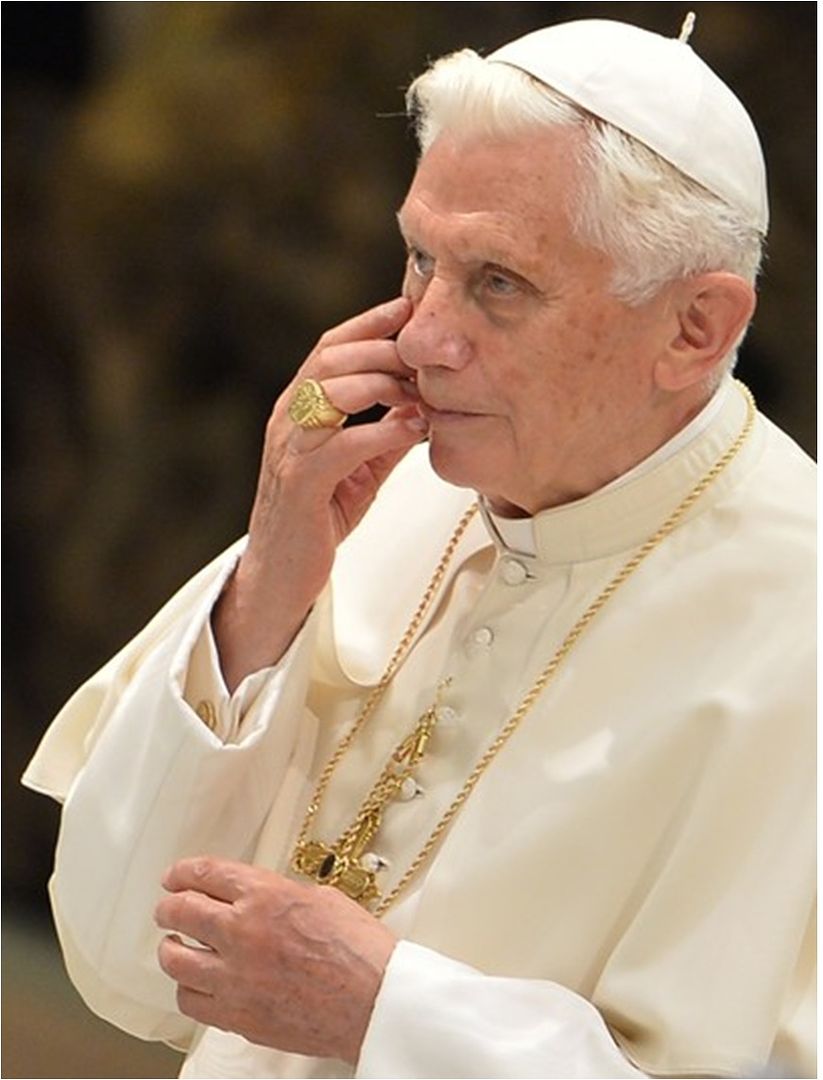

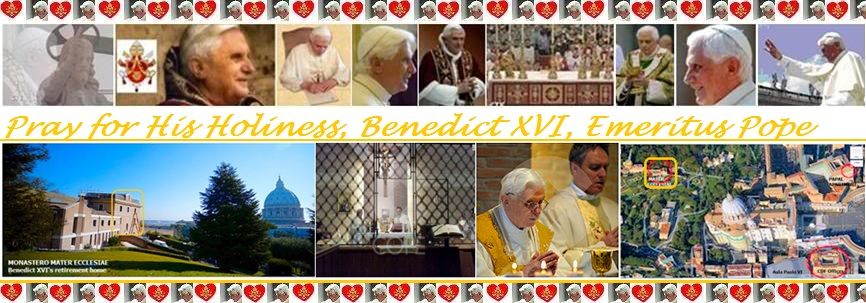
[Modificato da TERESA BENEDETTA 20/06/2013 18:02] |